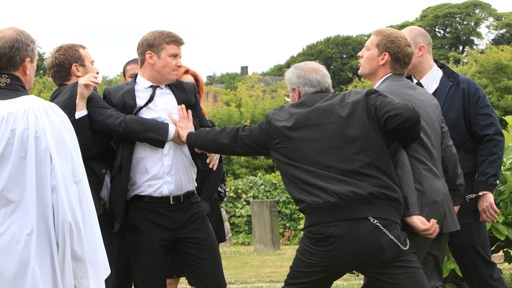WHEN FUNERALS TURN UGLY
Today’s guest post is written by Pastor Dieter Reda:
Grief sometimes brings out the worst in people. Add to that the fact that funerals sometimes bring families together even when they don’t want to be together, and you have a recipe for disaster. I have witnessed several family conflicts at funerals but one remains indelibly fixed in memory, as if it were yesterday.
It involved a large family that had been feuding for decades. As with most family feuds, many did not even remember what started the feud, only that there is an “us” and a “they” and never the twain shall speak nor meet. Now the matriarch of the family had died, and two siblings, who hadn’t spoken to one another in decades both arrived at the funeral home expecting that they would be in charge of the arrangements.
The arrangements conference turned ugly as the old bitterness surfaced with everyone’s defenses down It became a shouting match. The funeral director tried in vain to mediate, and without taking sides of course, he pleaded with all to call a truce until their mother had been buried. No dice. Soon it became physical and the funeral director threatened to call the police. Before he could do so, the big brother, all 300 pounds of him landed at the bottom of a stairway. The director called 911 which brought police, ambulance, and fire department to the funeral home. The big brother was taken to the hospital with multiple fractures to spine and hip. He was in the hospital for his own mother’s funeral. The person who had done the shoving was charged with assault.
It was my task to officiate at the funeral, as the deceased was a member of my congregation. I did what I always do, and called a family meeting to plan the service. There needed to be two meetings, because hardly anyone was on speaking terms. There were two separate viewings on two separate evenings so that the warring factions did not have to interact with one another. That was ackward for friends – which visitation do you attend, without offending the other side? The service itself was held at the funeral home, which was configured in such a way that each family group could sit in separate rooms and still see and hear me, without having to look at each other. They rode to the cemetery in separate limousines. Around the grave, they stood as far away as possible. The post-service reception was at the church, with the principal mourners at opposite ends of the room of course. I made sure to spend an equal amount of time with each. As I started to go over to the other group, someone from the first group asked, “why do you have to go and speak to them?” My answer was simply, “because they too have lost their mother.”
Afterwards one of the siblings asked to speak to me privately outside. He took out a wad of cash and began to peel off some big bills to give me. I explained that my honorarium had already been taken care of with a check from the funeral home, the amount of which would be added to the family’s bill. (It’s called a disbursement in the industry). At which point he hollered at me, “so my money isn’t good enough for you?” and stuffed the bills into my suit jacket. I took them out and counted them and said that I would treat them as a donation to the church, and make sure that he received a tax-deductible receipt. I knew that if I accepted the money, there would be all sorts of innuendo about double dipping for openers.
How can families avoid this kind of thing?
- Keep lines of communication open. If there are differences, resolve them as sooner rather than later. Life is too short.
- Be sure you know who legally has the final say about whatever your wishes are for your final arrangements. In some jurisdictions the next of kin (and the law spells out who that is and in what order they have the power to act) and in others the executor of the estate has the final say. Make sure it is someone whom you trust to carry out your wishes.
- Pre-arrangements help the survivors understand what your wishes are, rather than having to guess “what she would have wanted”. Make these arrangements when you are not under any pressure. Pre-pay if you can.
- If you are a surviving adult, then behave like an adult. Don’t act like an idiot, because if you do, what people will remember and talk about you for a long time, instead of your loved one.
- Respect is a currency that must be earned, and if lost cannot always be recovered. Perhaps your actions will be forgotten by some, but not by those closest to you, like your children who pick up more than you think! Don’t forfeit this currency, just to make a point!
- Remember, the funeral is not about you.
****
Dieter Reda has been an ordained Minister for the past 34 years and served various churches in central and western Canada. Since 2003 he is senior pastor at Mission Baptist Church in Hamilton, Ontario (Canada). His blog of pastoral musings on various issues is at www.dieterreda.com and you can follow him on Twitter @Dieterreda.

